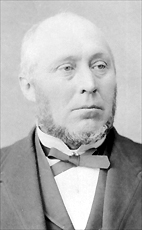Henry Nicholas Paint
| Henry Nicholas Paint | |
|---|---|
 |
|
| Member of the Canadian Parliament for Richmond |
|
|
In office 1882–1887 |
|
| Preceded by | Edmund Power Flynn |
| Succeeded by | Edmund Power Flynn |
| Personal details | |
| Born |
10 April 1830 Belle Vue, Strait of Canso, Nova Scotia |
| Died | 29 September 1921 (aged 91) Artillery Place, Halifax |
| Nationality |
|
| Political party | Conservative |
| Spouse(s) | Christina St Clair McVean (first wife); Ella Cowdray (second wife) |
| Children | include (by first marriage) Flora St Clair, Mary Le Mesurier; and (by second marriage) Mander Paint |
| Residence | Belle Vue, Strait of Canso, Port Hawkesbury |
| Alma mater | Wolfville Academy |
| Occupation | politician, shipowner, merchant, property owner |
| Religion | Anglican, then Baptist |
| Parliament of Canada biography | |
Henry Nicholas Paint (10 April 1830 – 29 September 1921) was a Canadian politician, shipowner and merchant.
Henry Paint was the son of Nicholas Paint, JP, by Mary Le Messurier, both of old Guernsey families which had been trading with Nova Scotia since at least the mid-18th century; a 'Paint Island', off Canso, is recorded in 1750. In 1817 his father, a merchant shipowner and agent at Arichat, Nova Scotia, petitioned for land grants at Belle Vue on the Strait of Canso, where he built a stone house and had settled by 1822. Henry was educated in Guernsey and at the Wolfville Academy (today Acadia University), and served as a lieutenant-captain in the Canadian Militia during the Fenian raids.
He spent his early life as an insurance agent in the City of Halifax. He was elected to the Canadian House of Commons in 1882 as a Member of the Conservative Party for Richmond, Nova Scotia. In Parliament, he was a strong supporter of Sir John A. Macdonald, the first prime minister of Canada, and he promoted a large number of public and infrastructure works for Cape Breton, including the first marine railway, the first steamers from Boston, numerous wharves and warehouses, as well as post offices and lighthouses, and the bridge and railroad to Arichat, and he was instrumental in negotiating favourable trading terms for the Dominion with Norway and the West Indies. He contested the three general elections of 1887, 1891 and 1904, but despite his successes for the community, he was defeated on each occasion.
...
Wikipedia
